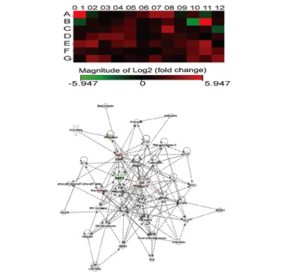
Dr. C. V. Srikanth’s group at Laboratory of Gut Infection and Inflammation Biology (LGIIB) of Regional Centre for Biotechnology, Faridabad have embarked studies using a multipronged approach on inflammatory bowel disease (IBD). IBD is an intestinal autoimmune disorder involving recurrent and abnormal immune activation resulting in a major healthcare challenge. In this work Salman Mustfa, Mukesh Singh and others from LGIIB have revealed a crucial role for a post-translational pathway called SUMOylation, a modification that can alter the fate of a protein. In murine model of IBD and human patients they demonstrate existence of an aberrant SUMOylation pathway leading to a global molecular signaling alteration including dysfunction of a master kinase, Akt1. This finding, a first of its kind in IBD, connect two very important cellular mechanisms (SUMOylation and Akt1) to intestinal inflammation and thus unravel these novel targets for possible therapeutic interventions. The work has been published in The Royal Society Journal ‘Open Biology’.
For full article:

